Welcome to your ultimate set of nursing pharmacology questions for the NCLEX! In this nursing test bank, test your competence in nursing pharmacology with these 500+ practice NCLEX questions. This quiz aims to help nursing students review concepts of nursing pharmacology and provide a challenging alternative to Quizlet or ATI.
Nursing Pharmacology Questions and Test Banks
In this section are the practice problems and questions for nursing pharmacology. There are 530+ nursing pharmacology practice questions in this nursing test bank. Nursing topics include medication administration, dosage calculations, general concepts about nursing pharmacology, cardiovascular drugs, antibiotics and anti-infectives, neurological medications, psychiatric medications, drugs for the respiratory system, gastrointestinal system, and endocrine system.
All questions on this set are updated to give you the most challenging questions, along with insightful rationales to reinforce learning.
Quiz Guidelines
Before you start, here are some examination guidelines and reminders you must read:
- Practice Exams: Engage with our Practice Exams to hone your skills in a supportive, low-pressure environment. These exams provide immediate feedback and explanations, helping you grasp core concepts, identify improvement areas, and build confidence in your knowledge and abilities.
- Challenge Exams: Take our Challenge Exams to test your mastery and readiness under simulated exam conditions. These exams offer a rigorous question set to assess your understanding, prepare you for actual examinations, and benchmark your performance.
- You’re given 2 minutes per item.
- For Challenge Exams, click on the “Start Quiz” button to start the quiz.
- Complete the quiz: Ensure that you answer the entire quiz. Only after you’ve answered every item will the score and rationales be shown.
- Learn from the rationales: After each quiz, click on the “View Questions” button to understand the explanation for each answer.
- Free access: Guess what? Our test banks are 100% FREE. Skip the hassle – no sign-ups or registrations here. A sincere promise from Nurseslabs: we have not and won’t ever request your credit card details or personal info for our practice questions. We’re dedicated to keeping this service accessible and cost-free, especially for our amazing students and nurses. So, take the leap and elevate your career hassle-free!
- Share your thoughts: We’d love your feedback, scores, and questions! Please share them in the comments below.
Quizzes included in this guide are:
Recommended Resources
Recommended books and resources for your NCLEX success:
Disclosure: Included below are affiliate links from Amazon at no additional cost from you. We may earn a small commission from your purchase. For more information, check out our privacy policy.
Saunders Comprehensive Review for the NCLEX-RN
Saunders Comprehensive Review for the NCLEX-RN Examination is often referred to as the best nursing exam review book ever. More than 5,700 practice questions are available in the text. Detailed test-taking strategies are provided for each question, with hints for analyzing and uncovering the correct answer option.
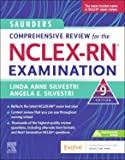
Strategies for Student Success on the Next Generation NCLEX® (NGN) Test Items
Next Generation NCLEX®-style practice questions of all types are illustrated through stand-alone case studies and unfolding case studies. NCSBN Clinical Judgment Measurement Model (NCJMM) is included throughout with case scenarios that integrate the six clinical judgment cognitive skills.
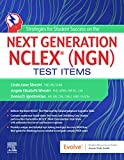
Saunders Q & A Review for the NCLEX-RN® Examination
This edition contains over 6,000 practice questions with each question containing a test-taking strategy and justifications for correct and incorrect answers to enhance review. Questions are organized according to the most recent NCLEX-RN test blueprint Client Needs and Integrated Processes. Questions are written at higher cognitive levels (applying, analyzing, synthesizing, evaluating, and creating) than those on the test itself.
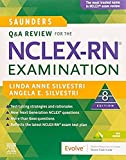
NCLEX-RN Prep Plus by Kaplan
The NCLEX-RN Prep Plus from Kaplan employs expert critical thinking techniques and targeted sample questions. This edition identifies seven types of NGN questions and explains in detail how to approach and answer each type. In addition, it provides 10 critical thinking pathways for analyzing exam questions.
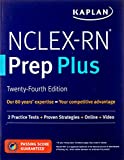
Illustrated Study Guide for the NCLEX-RN® Exam
The 10th edition of the Illustrated Study Guide for the NCLEX-RN Exam, 10th Edition. This study guide gives you a robust, visual, less-intimidating way to remember key facts. 2,500 review questions are now included on the Evolve companion website. 25 additional illustrations and mnemonics make the book more appealing than ever.
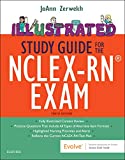
NCLEX RN Examination Prep Flashcards (2023 Edition)
NCLEX RN Exam Review FlashCards Study Guide with Practice Test Questions [Full-Color Cards] from Test Prep Books. These flashcards are ready for use, allowing you to begin studying immediately. Each flash card is color-coded for easy subject identification.
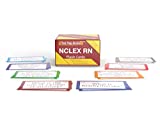
Nursing Pharmacology Review
Here are some study guides to help you review concepts about nursing pharmacology:
Gastrointestinal System Drugs
Respiratory System Drugs
- Antihistamines
- Bronchodilators and Antiasthmatics
- Decongestants
- Expectorants and Mucolytics
- Inhaled Steroids
- Lung Surfactants
Endocrine System Drugs
- Adrenocortical Agents
- Antidiabetic Agents
- Glucose-Elevating Agents
- Hypothalamic Agents
- Insulin
- Parathyroid Agents: Bisphosphonates, Calcitonins
- Pituitary Drugs
- Sulfonylureas
- Thyroid Agents
Autonomic Nervous System Drugs
- Adrenergic Agonists (Sympathomimetics)
- Adrenergic Antagonists (Sympatholytics)
- Anticholinergics (Parasympatholytics)
- Cholinergic Agonists (Parasympathomimetics)
Immune System Drugs
Recommended Links
An investment in knowledge pays the best interest. Keep up the pace and continue learning with these practice quizzes:
- Nursing Test Bank: Free Practice Questions UPDATED!
Our most comprehenisve and updated nursing test bank that includes over 3,500 practice questions covering a wide range of nursing topics that are absolutely free! - NCLEX Questions Nursing Test Bank and Review UPDATED!
Over 1,000+ comprehensive NCLEX practice questions covering different nursing topics. We’ve made a significant effort to provide you with the most challenging questions along with insightful rationales for each question to reinforce learning.
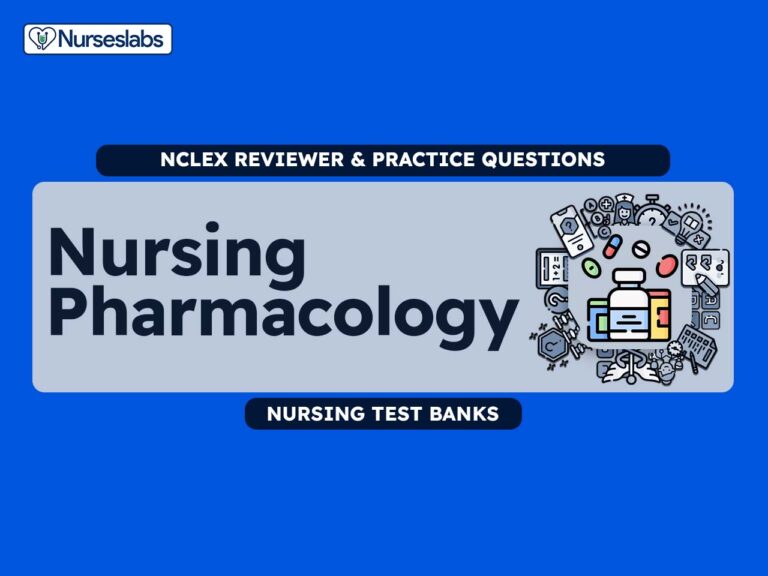
Thank you Vera for your wonderful work. You are really helpful to the world. God bless you
Thanks very much. This’s very helpful
Thank you Vera. May god bless you for all.
God bless you Vera and all that made these possible and accessible. You are a great gift to humanity!
Bless you Joe, thanks for your kind words!
Thank you Matt! You are a blessing to us who are aspiring to be a RN.
This is very useful resources… Great job from everyone in the team, thank you…
I need a copy of this question in PDF form. Thanks
I need the full pdf of these questions
Which browser can l use to open above questions?
All modern browsers like Chrome, Safari, Firefox and Microsoft Edge.
Thank you so much for your wonderful work Matt! I am preparing for NCLEX-PN exam, I was wondering this pharmacology quiz is related to RN or is it general for NCLEX?? Thanks
This quiz has been helpful. Thank you very much
Thanks so much, Nurseslabs and staff. I passed the Prometric exam for Qatar!! Keep up the good work and share review questions for us, nurses. God bless and more power!
Congratulations Raymond! Good luck on your journey as a registered nurse! :) God bless!
Thank you so much. God bless you!
This site is amazing! Was searching for NCLEX study programs and came across this right before I was about to pay $200 for another program. Using this instead and saving so much money!
I think you have a TYPO in Respiratory Question 7 of 30
7. Question: Montelukast (Singulair) is prescribed to a client with asthma. During the medication therapy, which of the following laboratories should be monitored?
Your answer: Correct Answer: D. Alanine transaminase (ALT) and aspartate transaminase (AST)
Montelukast (Singulair) is a leukotriene receptor and is used with caution in clients with impaired renal function. Alanine aminotransferase (ALT) and Aspartate aminotransferase (AST) should be monitored while taking this medication.
ALT and AST are LIVER ENZYMES and singular should be used with caution with HEPATIC patients? Or am I mistaken? Why would you want to monitor liver enzymes for renal function? Wouldn’t you want to monitor creatinine and BUN instead for RENAL patients?
I think you need to change RENAL to HEPATIC but I could be wrong.
Thanks for having these questions though! Very helpful. 😊
Thanks too,it was also very helpful to me.😊
I would really appreciate if you send me more of these questions so I can answer them.
Is there a way to create an account to save your progress and scores?
Thank you this wonderful guide
This was very good it was helpful thanks
Thanks for this
Hello Ebogor, You’re welcome! Glad you found it helpful. If you need any more resources or have questions about pharmacology or anything else, don’t hesitate to ask. Here to help!
Hello,
Regarding: NCLEX Nursing Pharmacology Mastery Challenge Exam (Quiz #2): Questions 23 and 24. The rational are the same for this two questions.
Also, is there a way to save my progress as I complete the exam?
Hi Anita, Thank you for bringing this to our attention. The issue with the rationales for questions 23 and 24 being the same has been fixed. We always appreciate it when our users help us spot areas for improvement.
Regarding saving your progress on the exam, I’m sorry, but currently, there isn’t a feature available to save your progress mid-exam. It’s definitely a valuable suggestion, and something we can consider for future updates to enhance the user experience.
If you have any more feedback or need further assistance, please don’t hesitate to reach out.
Thank you so much…Godbless
Thank you Elizabeth. God bless you.